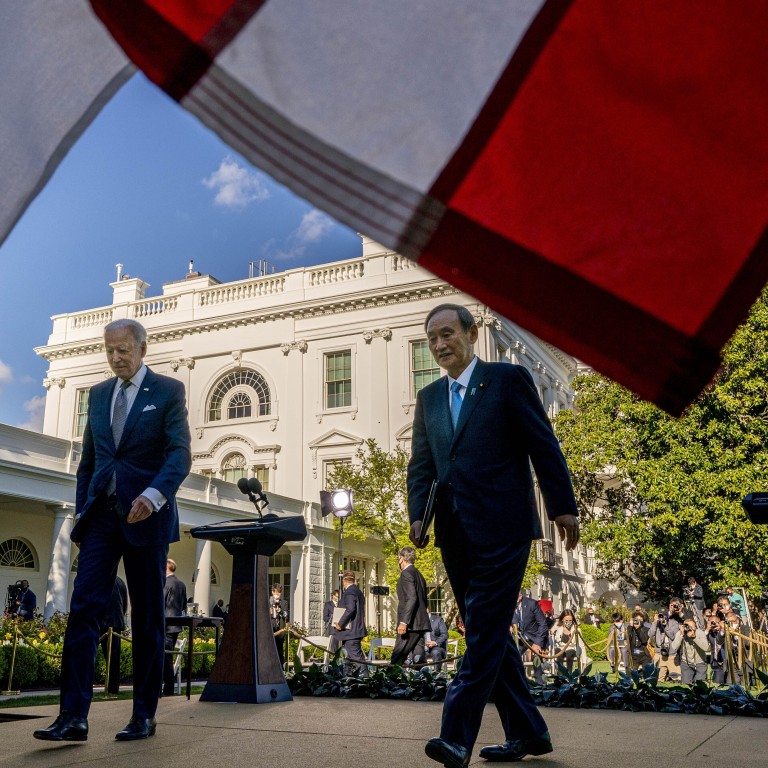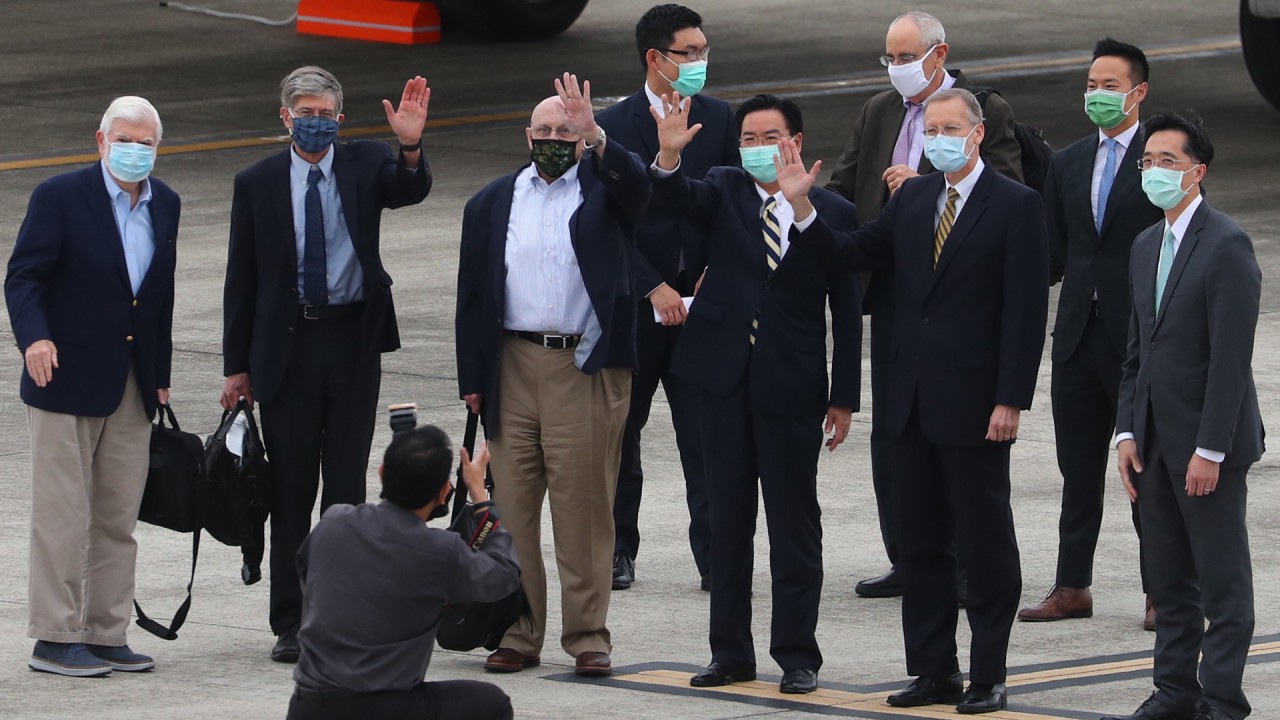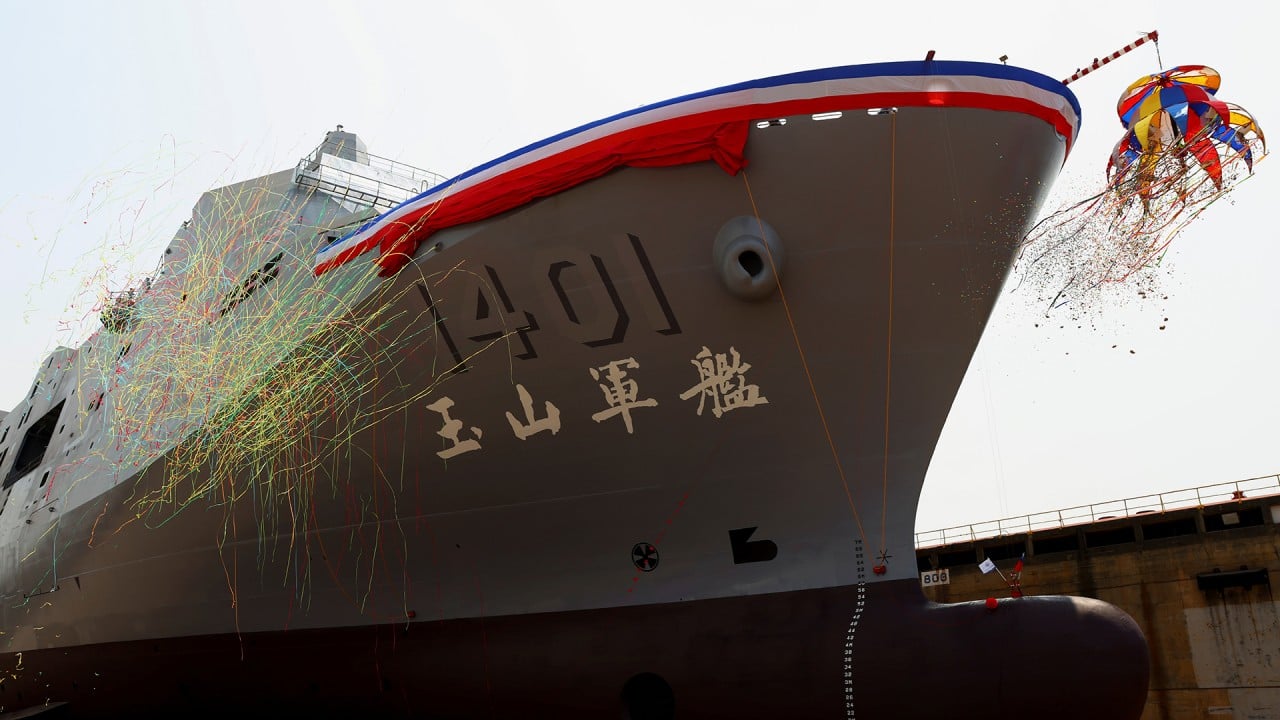
China accuses US and Japan of sowing division after Biden and Suga vow to counter ‘intimidation’
- The two leaders discussed a range of flashpoints and included a rare direct reference to Taiwan in their joint statement after meeting at the White House
- Beijing says their comments are ‘harmful’ as analysts warn Tokyo may face economic retaliation
Beijing has accused the United States and Japan of sowing division after they said they would counter China’s “intimidation” in the Asia-Pacific region and referred to Taiwan in a joint statement for the first time in over 50 years.
The Chinese embassy in the US expressed “strong concern and firm opposition” to the joint statement and vowed that China would resolutely defend its national sovereignty, security and development interests.
“These comments have gone far beyond the scope of normal development of bilateral relations. They are harmful to the interests of a third party, to mutual understanding and trust between regional countries, and to peace and stability of the Asia-Pacific,” an embassy statement said.
“It cannot be more ironic that such attempt of stoking division and building blocs against other countries is put under the banner of ‘free and open’.”
Biden, Suga call for ‘peace and stability across Taiwan Strait’
China topped the agenda of Friday’s meeting, Biden’s first face-to-face with a foreign leader since taking office in January.
“We committed to working together to take on the challenges from China, and on issues like the East China Sea, the South China Sea as well as North Korea to ensure a future of a free and open Indo-Pacific,” Biden told a joint news conference in the White House Rose Garden.
Although no major agreements on China were announced, both sides underscored the importance of “peace and stability across the Taiwan Strait” in the joint statement released after the meeting. They also expressed “serious concerns regarding the human rights situations” in Hong Kong and Xinjiang.
Biden and Suga also highlighted their commitment to tackle the risks from North Korea’s nuclear programme, work together on climate change and Covid-19, and invest more in 5G, artificial intelligence, quantum computing, genomics and semiconductor supply chains.
Suga told the press conference: “We agreed to oppose any attempts to change the status quo by force or coercion in the East and South China seas and intimidation of others in the region.”
Lu Xiang, a specialist in US affairs at the Chinese Academy of Social Sciences, said he felt Japan must clarify its position as soon as possible or expect to see its economic interests suffer and diplomatic ties go back to square one.
“This is the most serious political provocation to China since Sino-Japanese bilaterals were established,” Lu said.
“We do notice Suga’s comments on the Taiwan issue are not as strong as Biden’s so Japan must explain what it really means otherwise this could regress relations with China back to when diplomatic ties were normalised,” Lu said.
China says climate onus on US in John Kerry talks
“Japan can’t expect to maintain its economic interests with China while hurting China’s security.
“Japan has long been under the US sway when it comes to geopolitical autonomy but we wish to see Japan to maintain its strategic autonomy like we do with Europe, especially when it comes to important agenda such as Taiwan.
“Otherwise, it will not only damage the relationship with China but also contribute nothing to regional peace.”
The last time Taiwan was mentioned in a US-Japan joint statement was in 1969 when president Richard Nixon met Japanese prime minister Sato Eisaku.

Next year will mark the 50th anniversary of the normalisation of relations between China and Japan.
“This is very serious as it has breached the commonly accepted bottom line over Taiwan issues between China and Japan [for over a decade]. I think it has basically exhausted whatever that was left of China and Japan’s bilateral political foundations,” Shi said.
Last month, US Secretary of State Antony Blinken and Defence Secretary Lloyd Austin and Japanese Foreign Minister Toshimitsu Motegi and Defence Minister Nobuo Kushi met in Tokyo where the two nations “committed to oppose China’s coercion and destabilising behaviour towards others in the region”.
“It indicates the geopolitical strategic confrontation between China, Japan and the US will intensify. It also means the ideological opposition between China and US military allies will escalate,” Shi said.



